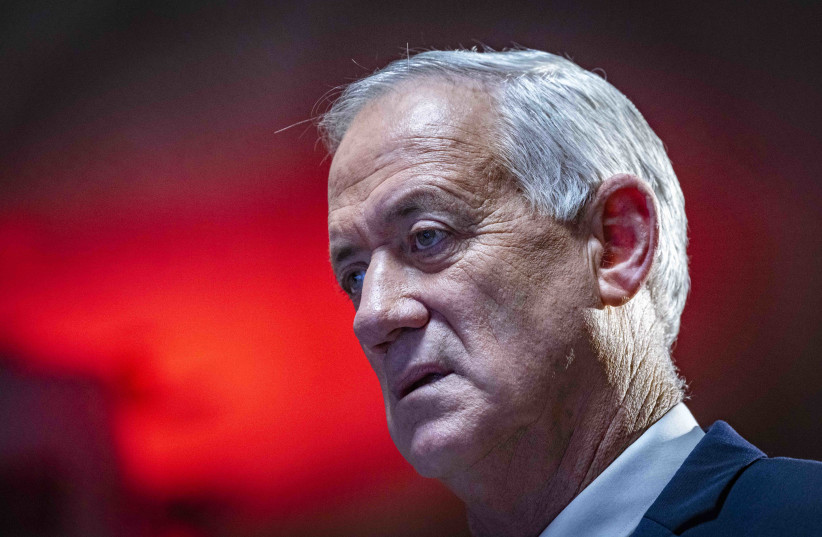The Israel-Lebanon maritime agreement provides Israel with deterrence against Hezbollah and Iran, Defense Minister Benny Gantz said Wednesday as the Israeli political arena remained divided on the deal.
“The regime in Lebanon continues to disintegrate as poverty increases,” he said during a talk he gave at Tel Aviv University’s Institute for National Security Studies. “In this situation, Hezbollah’s influence grows, and through it so does the Iranian influence.”
“The maritime border agreement will act as a deterrent” and “has the potential to reduce Iranian influence on Lebanon,” Gantz said.
"The regime in Lebanon continues to disintegrate as poverty increases. In this situation, Hezbollah's influence grows and through so does the Iranian influence."
Defense Minister Benny Gantz
“Instability and an economic and political crisis on our border create a reality of uncertainty,” he added.
Earlier this month, Israel and Lebanon agreed to a deal that sets a maritime boundary that would allow both countries to produce natural gas from two abutting underwater fields in the Mediterranean.

Opposition leader Benjamin Netanyahu has accused Gantz and Prime Minister Yair Lapid of caving in to Hezbollah, which had warned it would attack Israel if the Karish gas field goes into production without a deal.
Hezbollah knows it would have lost militarily in an exchange with the IDF and that it was better to avoid conflict rather than proving the point on the battlefield, Gantz said Wednesday.
Parliamentary vote not expected
The Knesset Foreign Affairs and Defense Committee (FADC) debated the issue on Wednesday. The deal has cabinet approval, but at this stage, it is not expected to receive a parliamentary vote.
The absence of a vote was a stain on Israeli democracy, Religious Zionist Party MK Simcha Rotman, who opposes the deal, told the FADC.
In Lebanon, the deal needed three different votes, so it appears that despite the fact that the country was collapsing, democracy was stronger there than in Israel, he said.
Amos Hochstein, the US energy envoy, will be in Beirut next week, carrying a copy of the maritime agreement with Israel for Lebanese officials to sign, Lebanese negotiator Elias Bou Saab told Reuters on Wednesday.
The deal – hailed by all three parties as a historic achievement – marks a diplomatic departure from decades of war and hostility and, once in force, will open the door to offshore energy exploration.
“Hochstein will be in Beirut next week with the agreement that we will sign,” Bou Saab said. He did not say when the deal would be signed.
The text stipulates that the two sides independently inform Washington of their approval of the deal. The US will then send a notice to each side that the deal has entered into force, and the signatories will then send the coordinates for the new border to the United Nations.
A traditional signing protocol with leaders from both countries present is unlikely given that Israel and Lebanon remain technically in a state of war.
Hochstein told a webinar hosted by the Middle East Institute on Tuesday he would be traveling to the region next week, but he did not give dates or destinations.
“The president of Lebanon and prime minister of Israel will decide on the signing. Stay tuned in the next few days,” Hochstein said.
Gantz said the deal was important to Israel both from a security and economic perspective.
The UN Security Council in New York “commended” the deal, stating a “permanent” delineation of the boundary was a “major step.”
It “will contribute to the stability, the security, and the prosperity of the region,” it said in a statement. “It will benefit both countries and their people and will allow both parties to benefit equitably from energy resources in the eastern Mediterranean.”
Reuters contributed to this report.
